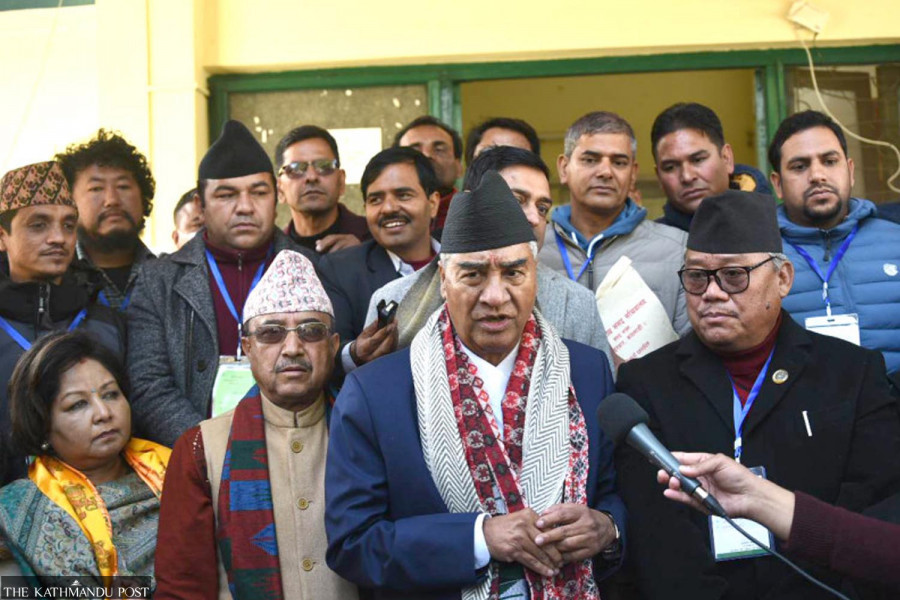Politics
Deuba’s own begin doubting his leadership
Supporters of the Congress chief hold separate gatherings to discuss his leadership and working style.
Anil Giri
On Monday, more than two dozen leaders close to the Nepali Congress President Sher Bahadur Deuba held a separate meeting and discussed the state of “indecisiveness” of the party and criticised the role of Deuba. They were the same leaders who used to extend their support to Deuba from inside and outside of the party and were known to be in the Deuba camp.
In the gathering, they discussed the continued deferral of the party’s central working committee meeting as well as the growing indecisiveness within the party, particularly after the results of the November 20 elections.
“Our concern is that the party president, office bearers and central work execution committee have taken the party hostage,” said one leader close to Deuba. “If the central committee does not meet on time, then what is its use?”
The Central Working Committee (CWC) is one of the highest decision-making bodies of the Nepali Congress that takes relevant and required decisions for the party, as and when needed.
The CWC was scheduled to meet much earlier, but is now postponed indefinitely.
“Until the elections to the President and Vice President, the meeting of the central working committee is unlikely to take place,” said a Congress office bearer.
Essentially, Deuba and his supporters do not want to hold the meeting before the presidential elections, fearing harsh criticism of some of the recent positions taken by the party. Deuba is at the centre of the criticism after a meeting of the work execution committee decided to give a vote of confidence to the Pushpa Kamal Dahal government.
“This decision was supposed to be taken by the party’s central committee, but Deuba instead called the meeting of the Central Work Execution Committee and forced them to take the decision to extend support to Dahal’s government,” a central committee member said. “After giving a vote of confidence to Dahal, the position of the party in Parliament is not known.”
Since the Congress has extended its vote to Prime Minister Dahal, there is debate over its status in the House whether it is an opposition party or the ruling one. Although Congress leaders claimed that they will sit on the opposition bench and will perform the role of an effective opposition in the House, the party is yet to form their shadow government that will check and ask questions to the government.
“We will form the shadow government and play an effective opposition in the House to make democracy and the parliamentary system functional,” said Arjun Narsingh KC, adding that the Congress is the “government in waiting”.
The last meeting of the Central Committee concluded on July 18 last year. Since then, a lot of political developments have happened in the country, but Nepali Congress does not feel the need to discuss any of them in the party.
The most irritating moment for Deuba was on December 25 when he refused to hand over the premiership to Dahal. But Deuba’s repeated refusals to hand over the premiership to Dahal denied the Congress several positions of power. Many Congress leaders demanded a discussion on how their party had to give up major posts and portfolios both at the centre and provinces, but Deuba was reluctant to discuss the matter in the party’s central committee.
“Important decisions of the party are now being taken by office bearers and the Central Work Execution Committee,” said Nain Singh Mahar, a central committee member considered close to Deuba.
The meetings of the central working committee have not been held for long. The party charter does recognise the central work execution committee, but any decision taken by the office bearers is unsystematic.
According to Mahar, if the Congress takes part in the presidential race, the party could convene a central committee meeting. Otherwise, the next meeting of the central working committee is expected to take place only after the presidential elections scheduled for March 9.
KC said all efforts of the party are now to secure the top post. “We know party’s meetings are not taking place on time. They are not regular but our focus is on securing the post of President. The Nepali Congress is united in the objective. We know the economy is in a bad shape and geopolitical sensitivity has become more challenging than in the past. We are fully aware of what is happening in the state affairs, but at present our focus is on securing the post of President,” said KC.
Besides these issues, Deuba is also failing in giving a full shape to the various party departments, holding the convention of party’s sister organisations and convening the policy convention, which was left out during the 14th general convention last year.
Some experts and observers said that the indecisiveness of the Nepali Congress is temporary, but it should be able to correct its ways of functioning. “As someone said, the state of Nepali Congress can be termed as delightfully disorganised,” said Uddhab Pyakurel, who teaches political sociology at Kathmandu University.
“The dilemma in the Nepali Congress is natural because if Deuba had agreed to hand over the premiership to Dahal, a section of the political class would definitely target and attack him. As the crusader of democracy, federalism and other progressive agenda, people do not have a choice over the Nepali Congress. So, while the very existence of Congress remains debatable, it holds out a promise too,” Pyakurel added.




 13.12°C Kathmandu
13.12°C Kathmandu














